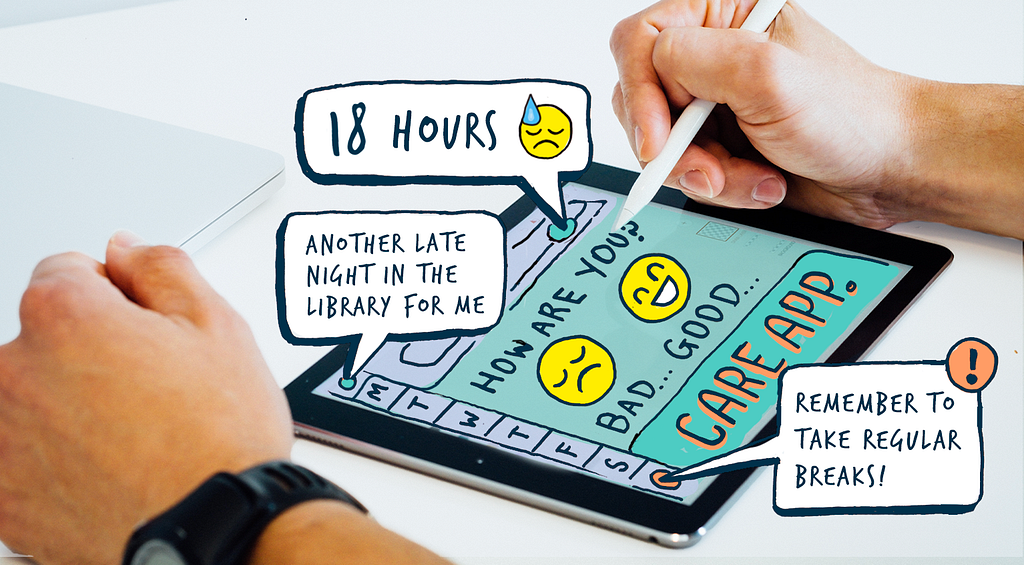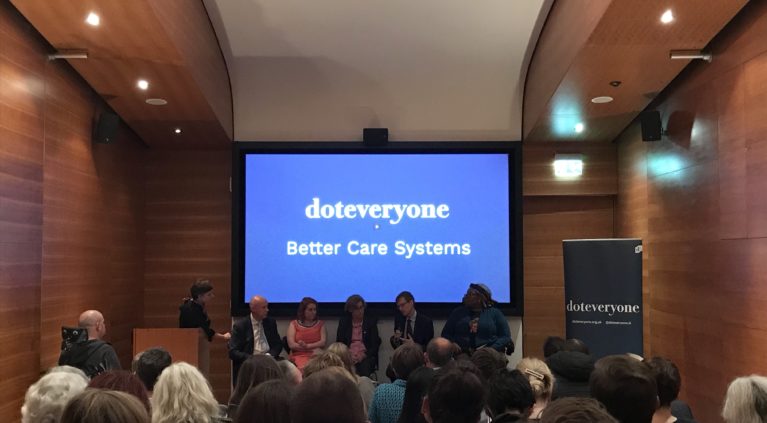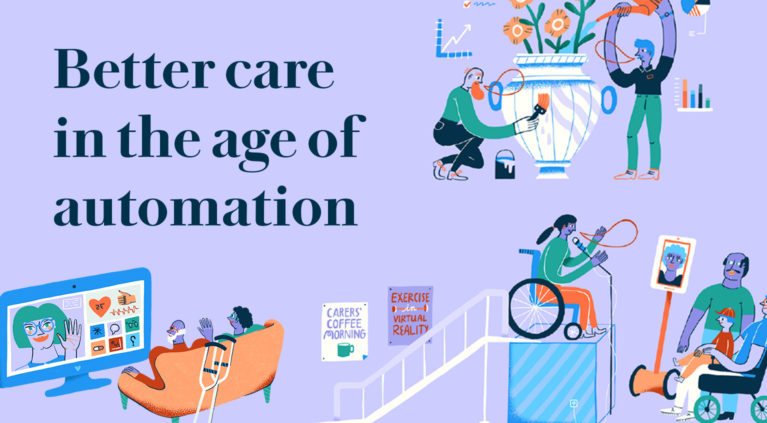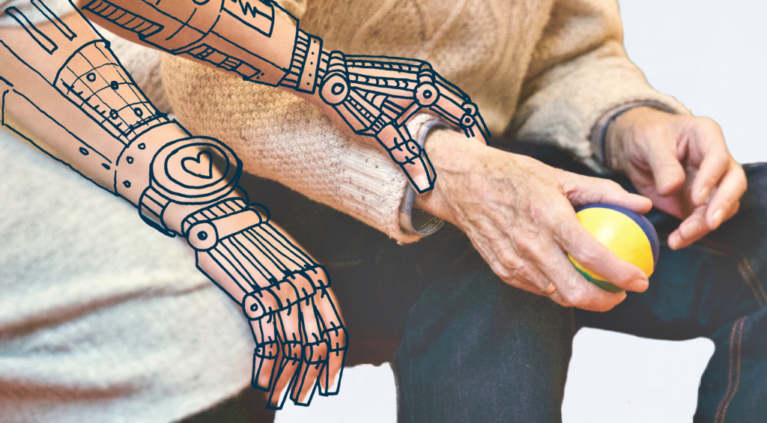A mental health crisis on campus? There’s an app for that.
From the culture of basic scientific research through to wellbeing apps — how digital technology is affecting care and connection in universities.

A care crisis on campus
The UK’s universities are in the midst of a mental health crisis.
The number of students seeking mental health support rose by 50% between 2012 and 2017, whilst the University of Bristol made headlines for the wrong reasons following the loss of 12 students to suspected suicide in the past three years. Only 17% of students surveyed in 2018 are very happy with their lives, down from 21% since 2016 alone.
The magnitude of the problem has led the university regulator, the Office for Students, to launch a £6 million challenge to generate new approaches to mental health in higher education. Work is also underway to develop a University Mental Health Charter.
But it’s not just the students who are suffering. Researchers and staff are under similar strain — 46% are lonely at work, with this figure rising to 64% for PhD candidates.
This has profound and deeply worrying consequences for individuals and the sector. Social isolation significantly damages academic performance, and has been estimated to increase risk of death by around a third — more dangerous than obesity, on a par with smoking.
New models, new pressures
This crisis is set against the backdrop of increasing competition between universities amidst a challenging economic climate, within which technology is playing an increasingly influential role.
Recent research by PwC finds traditional university business models that emphasised quality teaching and niche world-class research are gradually being superseded by a focus on innovation, corporate partnerships and a race to be leaders in the use of digital technologies. This transition is reflected in initiatives such as the Erasmus-funded Universities of the Future programme, which looks to bring universities together under the collective goal of developing “education 4.0”:
“All universities are very much struggling to answer the question of: What does digitisation mean, and as technology rapidly changes, how can we leverage it?” — James Antony, Director of Harvard University Graduate School of Education
Does correlation equal causation?
Despite rising mental health challenges coinciding with increased digitisation and the emergence of new business models in universities, relatively little attention is being given to the relationships between these trends. By connecting the dots, can we better understand how digital technologies could improve, not hinder, care in universities?
Through speaking with students, public engagement specialists, academics, technologists and pastoral care staff from universities across the UK, we’ve found out how digital technologies are radically impacting relationships and networks of care within academia.
The increasingly digitised university experience is redefining the relationships between students, staff and campuses. Collaborative digital working tools and omnipotent communication channels are creating a 24–7 learning and working environment, amplifying the campus culture wars and assuming social roles once reserved for sticky-floored student unions. Fierce competition both between and within universities is playing into a technological arms race, with many pinning their hopes on digital to propel them up league tables that are increasingly becoming an “obsession”. This piece shines a light on these dramatic shifts, and explores how universities are responding to them in attempts to move towards a better care future.
The wellbeing app will see you now
University care services are under strain. The proportion of students seeking support for mental health conditions has grown five-fold in the past ten years, and 94% of UK universities report an increase in demand for counselling services.
In response to this swelling need, many universities are turning to digital technologies to ease the pressure on offline care services.
Some are exploring online self-help and mindfulness podcasts to help students manage their anxieties. A proliferation of apps (such as the University of Edinburgh’s Feeling Good, University College London’s Positive and Mind’s Emoodji) are springing up across the UK, looking to build resilience across student bodies and prevent potential mental health issues from snowballing.
These initiatives are undoubtedly well-intentioned. But that has not stopped them being dragged into noisy public debates surrounding the wellbeing industry, where critics allege the drive to commodify self-care, mindfulness and wellness has led to a worrying mainstreaming of questionable health advice (see ‘Body Vibes’ stickers that allegedly raise the “frequency” at which the body vibrates to a calmer level, or alzheimer-curing truffles).
While no one is suggesting universities’ digital care services come close to this level of pseudoscience, some in the sector remain sceptical.
Apps including Calmharm, Big White Wall and Moodscope have been formally endorsed by the NHS as clinically effective. But a recent review by the non-profit health policy body the James Lind Alliance has found the evidence-base for digital mental health interventions as a whole remains inadequate. The comments of Dr Laura Biggart, co-founder of University of East Anglia’s wellbeing app OpenUpUEA, reflect the general mood of a sector tentatively waiting for this evidence: “Evaluations of wellbeing apps are few and far between, and there’s still a lot of work to do for all universities”.
And research exploring tech in other areas of health is undermining the received wisdom that giving individuals control of their own wellbeing always leads to empowerment — young people using fitness trackers in a 2017 study complained of overwhelming feelings of guilt in the long-term, and research has found sleep tracking app-induced anxieties ironically led some users to develop insomnia.
“It’s important we don’t see a shift to apps and put responsibility on the individual for their own care as a way of shifting away from other care structures”— Michael Priestley, Student Mental Health Research Network
Many mental health conditions involve experiencing anxiety, loss of energy and guilt. Can we be certain digital services that place responsibility on students to self-manage their own wellbeing won’t unintentionally make things worse?
Concerns around a lack of a strong evidence-base and wariness around placing too much burden on individuals have led some to question why universities are so eager to embrace scalable and cheap digital wellbeing services.
Alan Percy, Chair of Heads of University Counselling Services and Head of Counselling at Oxford University, answers these questions unequivocally: “some universities are using the wellbeing agenda to downgrade or remove altogether professional counsellors and psychologists, replacing them with more generic, non-clinically trained wellbeing support”.
Taking the campus culture wars online
When a group of five Harvard students created Facemash in 2003, it’s unlikely they anticipated the radical impact their work would have on their campus down the line. Fast-forward 16 years and their social media platform — Facebook, to use its current name — boasts over 2.3 billion global users and has a GDP comparable to Serbia. In universities — as in wider society — the impacts of this growth have been profound.
Fear of unfiltered algorithm-driven backlash and online witch-hunts are creating new pressures in the minds of students and staff
Of the myriad ways social media is changing the social dynamics of universities, its effects on campus ”culture wars” are amongst the most politicised. For some, these platforms represent a safe space in which to express their true identities, where free speech can flourish in the face of allegedly increasing censorship on campus. For others, fear of unfiltered algorithm-driven backlash and online witch-hunts are creating new pressures in the minds of students and staff.
57% of US students in a 2018 Gallup poll said that most of their social and political discussions take place online, with 59% agreeing that a fear of being attacked on social media stifles free expression. A recent report from the Universities UK Taskforce on harassment in universities found such platforms are prominent vehicle for sexual violence harassment and hate crime.
“I spent a long time with a student last year who was anxious that her understanding of feminism made her transphobic — I can’t imagine having those conversations with someone ten years ago in such depth, where there was quite so much fear of vitriol and social repercussions online” — Anonymous interviewee
Elsewhere omnipotent digital communications and collaborative digital learning platforms are a similarly mixed blessing. On the one hand, digital learning environments give flexibility to those less suited to the rigidity of a 9 to 5 schedule, including one former PhD student interviewed who stated plainly that “my ability to do things on the internet is the only reason I got a degree, because I never went in”.
But the price of this new freedom and accessibility is a nagging expectation to always be switched on, as echoed in the comments of University of Durham student Michael Priestley: “If you’re involved in a student project instead of organising meetings and get-togethers you’ll have a facebook group. But the group never stops, it’s active 24/7. Whilst it’s convenient, it can also be difficult to get space away from those things.”
These stresses pile on top of a wider set of pressures, where “the language of finance and fees trickles down to students who are constantly weighing up worth…It becomes a bit infectious, embeds competition and feeds a constant anxiety that other people are getting ahead”
The race to “campus 4.0”
This competition between students is a microcosm of the wider university landscape.
League tables, student satisfaction surveys and teaching and research excellence frameworks (REF) reflect a sector in which universities rely on metrics and rankings to show their worth in a hyper-competitive economic climate.
Since the removal of student caps in 2014, British Universities have borrowed £10.8 billion in a race to secure their piece of a sector that generated £36 billion in 2018. With a drop in EU student numbers anticipated post-Brexit and a tuition fee review on the horizon, the financial stakes are getting higher.
“blended” and “flipped” learning approaches are expected to become increasingly commonplace
In response, many universities are turning to digital technologies in pursuit of scalable online distance learning products, and an “innovative and unique brand”. University libraries are reimagining themselves as concentrated service hubs managing digital archives. And “blended” and “flipped” learning approaches — where online learning plays a key role — are also expected to become increasingly commonplace over the next decade.
Technologies are also leading many institutions to reconfigure their campuses. The construction giant Balfour Beatty predicts lecture halls will fragment into a series of flexible smaller learning spaces in response to an increasingly digitised learning environment, while the University of Nottingham is monitoring wifi use as a proxy for footfall to understand how they can use campus space more efficiently.
How universities will approach this restructuring is an open question. Those that can will repurpose space for social needs, but for others feeling the squeeze, the temptation to leverage this newly freed-up space for financial benefit is strong. The risks of this to the social fabric of universities are reflected in the comments of one anonymous pastoral care professional interviewee, who described how “we don’t have common rooms anymore…the shift of social life is quite challenging and my guess is it limits the amount of new people you can meet. It feels like quite a loss.”
Economic pressures have also sharpened universities’ focus on reaping the rewards of technological innovation. Tech accelerator programmes such as Oxford University Innovation and the SETsquared partnership (a collaboration between five Russell Group universities) show how some are moving to keep the gains of promising research in-house.
The structure of the academic job market bears an unfortunate resemblance to a drug cartel
This race to capture technological innovations early in the pipeline (and boost REF rankings) has led to growing competition for “superstar researchers”, with one study finding the structure of the academic job market bears an unfortunate resemblance to a drug cartel. Elite high-earning researchers are supported by a mass of rank-and-file outsiders, ready to “forgo wages and employment security in exchange for the prospect of security, prestige, freedom and reasonably high salaries that tenured positions entail.”
This winner-takes-all environment — which is particularly pronounced in basic science and technology research — poses obvious challenges to care in universities. One chemistry PhD student at a Russell Group University (who wished to remain anonymous) described the risk of burning out, where “the more hours you do, the better you are…The antidote for struggling with your work is more work”. A desire to be seen as resilient and successful seems likely to contribute to stigma around seeking help: Only 6.7% of UK academics have disclosed a mental health condition, despite an estimated 43% suffering from them.
The emphasis on the intellectual aspects of university life over emotional ones creates what the educationalist Sir Anthony Seldon has called the “unhelpful divide”, with pastoral support that exists outside of ranking systems and metrics relegated to a secondary concern. Care can come to rely heavily on the empathy of those within a given department. This results in a care system described by one university-based public engagement specialist as “individually excellent, structurally fucked.”
Better care in universities
Digital technologies pose challenges to care in universities at every stage of their lives, from the culture of basic scientific research to their impact on campus culture wars. But universities can, and are, reacting to these challenges, seeing technology as one part of a holistic approach to improving care on campus.
In the face of campus restructuring wrought by digitisation, more attention is being given to the relationship between the design of campuses and wellbeing. In 2017 BurroHappold kicked off a programme of research exploring how to design university spaces to improve student mental health. Royal Holloway’s Hox Haus building was developed in response to shrinking campus spaces and student rooms as a common area designed to maximise “social interaction and wellbeing”.
Some universities are thinking carefully about where digital care services should sit in the wider care ecosystem and grounding them in the context of their local student communities.
“The key thing is [digital wellbeing apps] are for students, by students. It’s not just academics telling students what they need and want” — Dr Laura Biggart, co-developer of OpenUpUEA
Initiatives such as OpenUpUEA and the University of Plymouth’s SHINE service have involved students in their development and promotion to ensure services meet their actual needs. OpenUpUEA also claims to be the first app of it’s kind to connect a mood tracker to specific care services available in the local area, to ensure it complements, not displaces, other care services.
Universities UK is also coordinating the development of a unified evaluation framework for university mental health services, under which emerging digital technologies will be assessed.
Universities have started to acknowledge the issue of academic isolation
There are also signs that the tide is beginning to turn against a hyper-competitive culture of science and technology research. Universities have started to acknowledge the issue of academic isolation and have introduced some “easy-wins” such as setting up writing retreats, policies of office attendance, away days, and coaching.
But the next step must be for collective academic achievement and performance in mental health and wellbeing to be recognised in the rankings and metrics that universities are increasingly beholden to. A Care Excellence Framework, that acknowledges universities’ massive contribution to the human flourishing of students, staff and local communities, sounds like a good idea to me.
Better Care Systems
Doteveryone is exploring how we can build better and fairer care systems in a future of robots, automation and smart technology.
Throughout the Better Care Systems project, we’re asking carers, technologists, activists, and people who use care services, (and many who fall under more than one of these too-limiting labels) to imagine new futures of care in which the system is fairer, more sustainable and more effective.
We’re thinking holistically about care, exploring its role in the social infrastructure of many different aspects of people’s lives — not just in the paid social care sector, or for the elderly.

A mental health crisis on campus? There’s an app for that. was originally published in Doteveryone on Medium, where people are continuing the conversation by highlighting and responding to this story.






